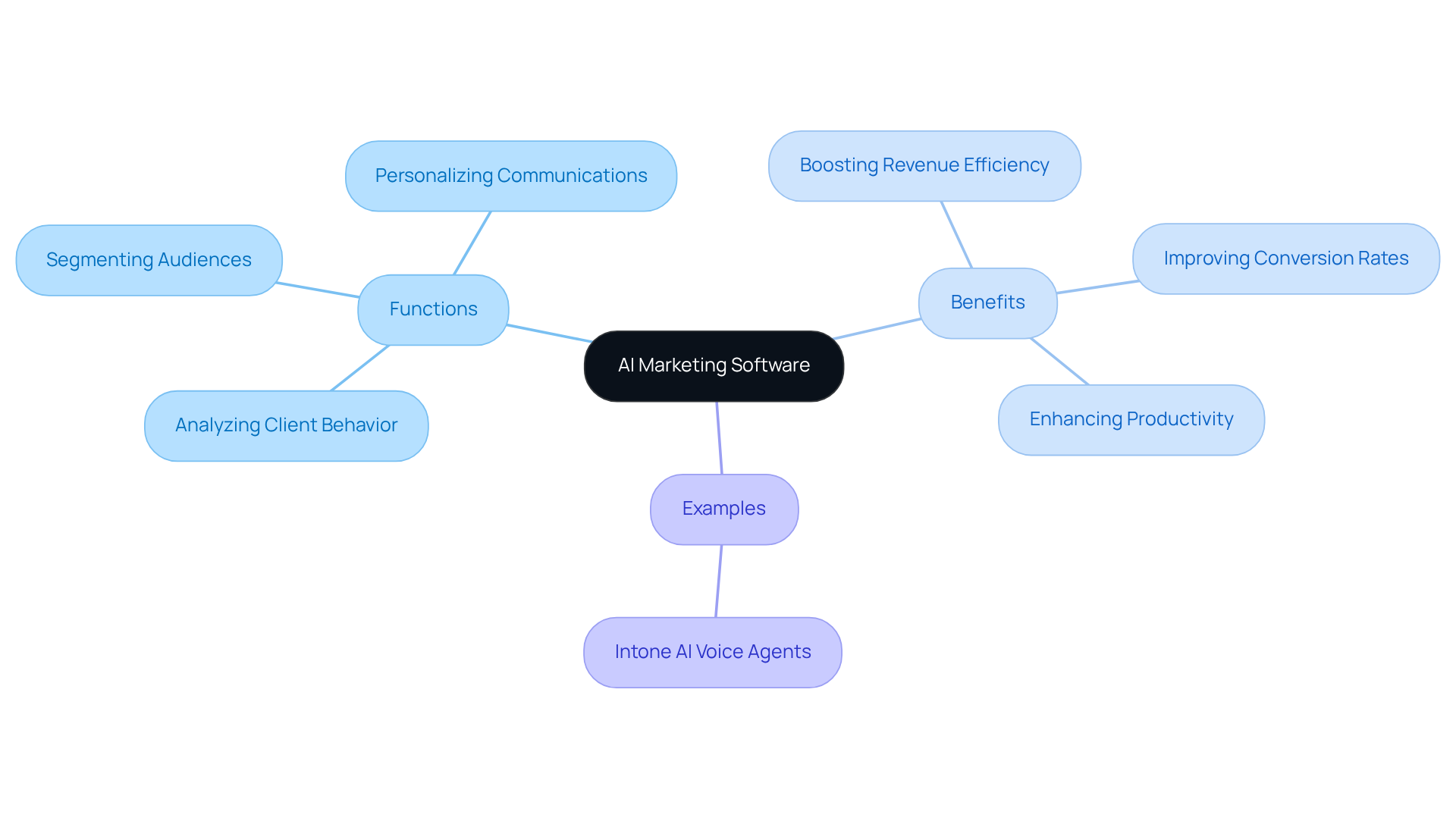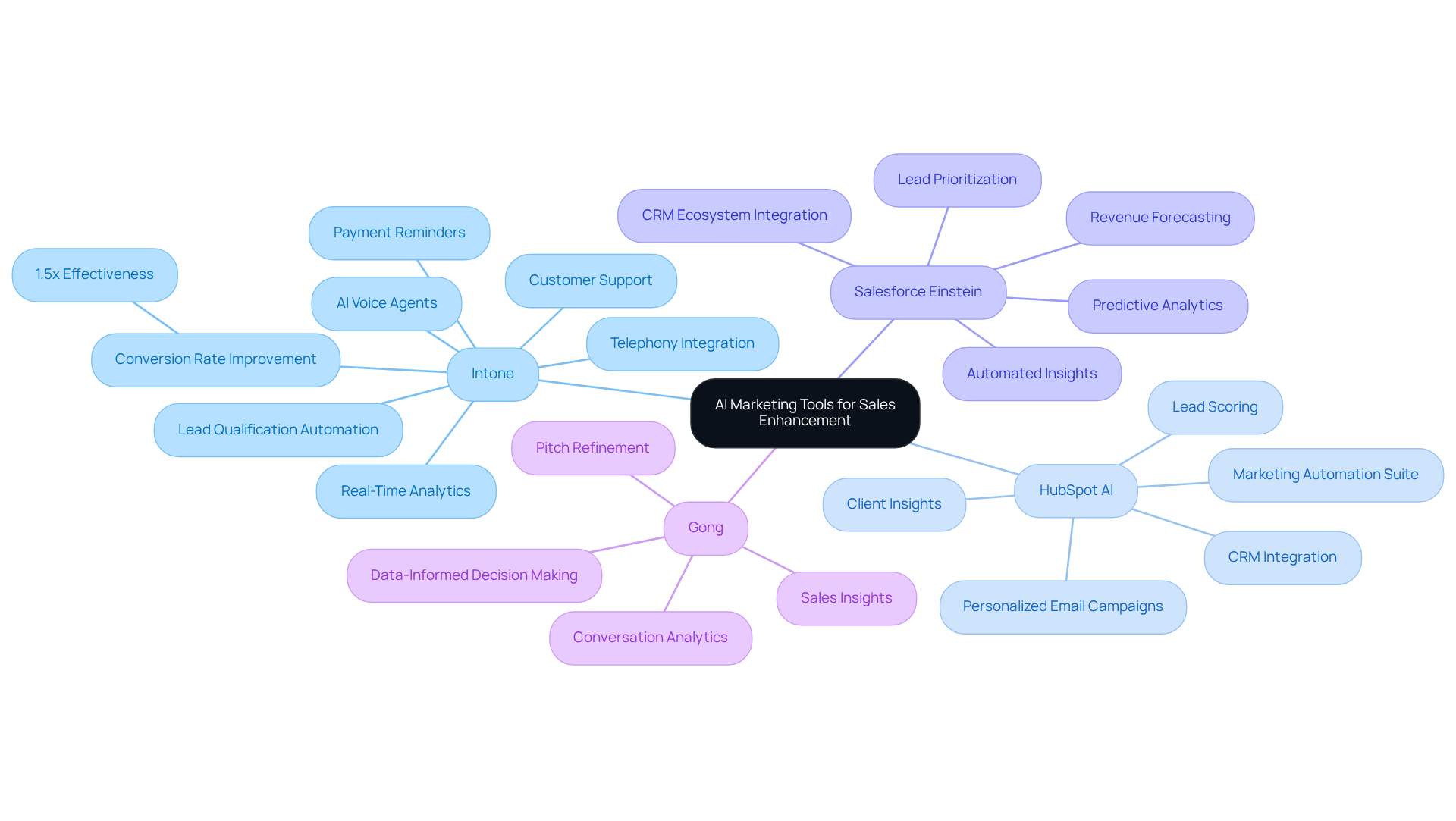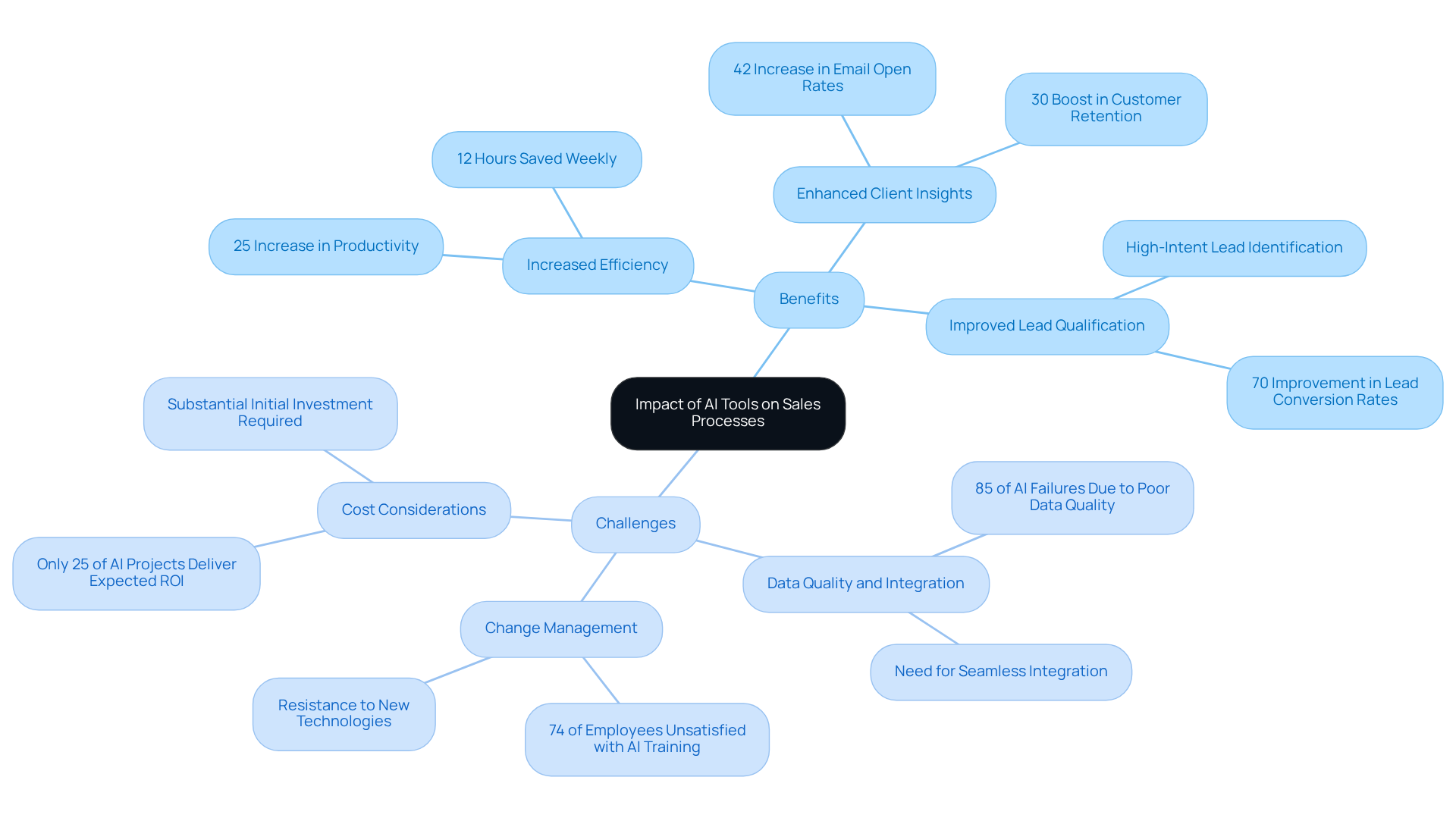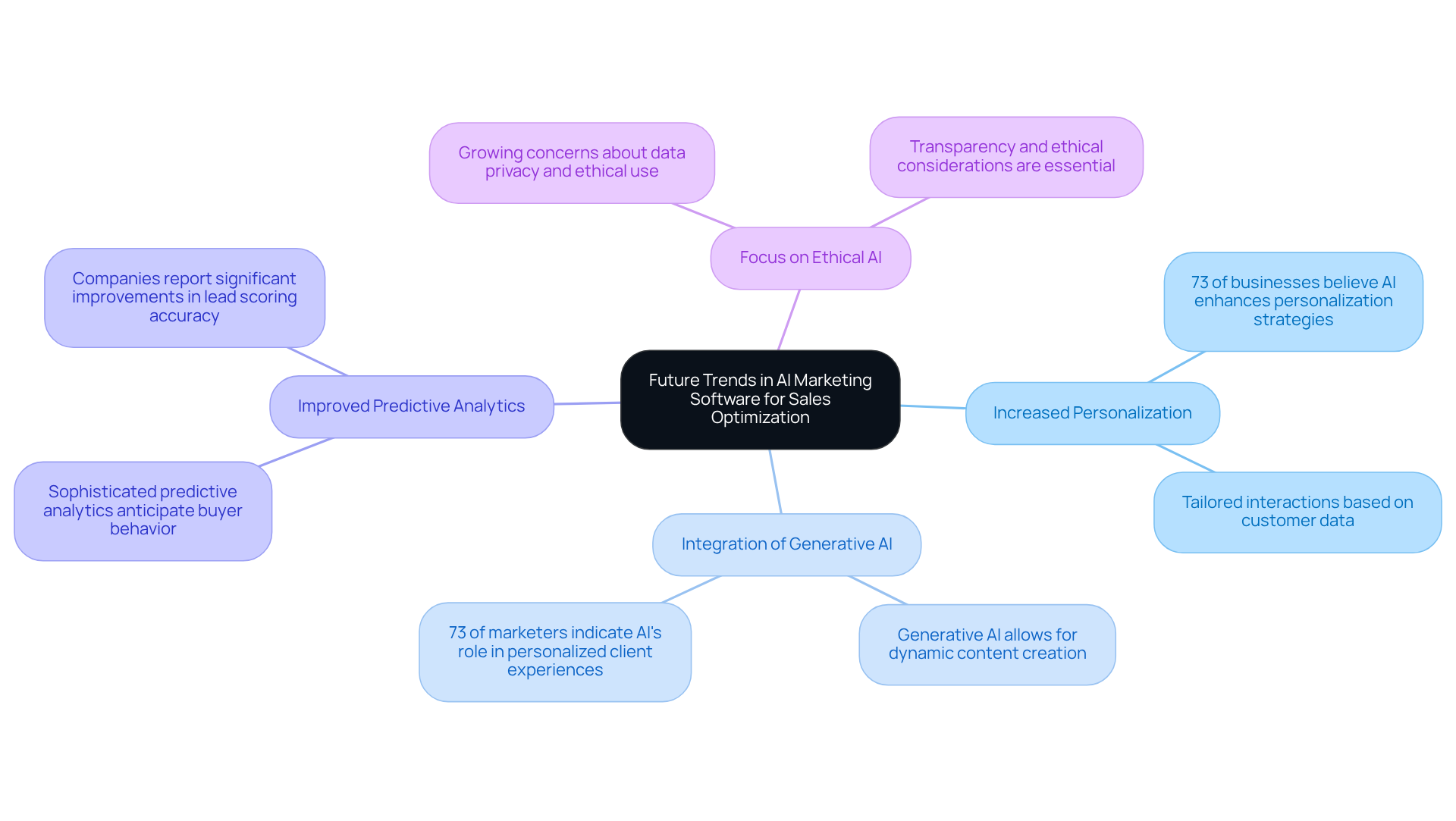Introduction
The landscape of sales is experiencing a seismic shift, fueled by the integration of artificial intelligence marketing software that harnesses the power of data analytics and machine learning. These innovative tools not only streamline marketing tasks but also significantly enhance sales efficiency. They empower businesses to identify high-intent leads, automate follow-ups, and personalize communications effectively.
However, as organizations navigate this promising terrain, they encounter critical questions:
- How can they effectively leverage AI to boost conversion rates while overcoming challenges like data quality and integration?
- Addressing these concerns is essential for maximizing the potential of AI in sales.
This article delves into the top AI marketing platforms available today, comparing their features and effectiveness in transforming sales processes for success. By exploring these platforms, businesses can gain valuable insights into how to harness AI to drive their sales strategies forward.
Understanding AI Marketing Software and Its Role in Sales Efficiency
The power of machine learning algorithms and data analytics is harnessed by artificial intelligence marketing software to automate and elevate various marketing tasks. These advanced tools excel at:
- Analyzing client behavior
- Segmenting audiences
- Personalizing communications
These are key components for effective marketing strategies. The integration of artificial intelligence marketing software is becoming indispensable for boosting revenue efficiency, allowing businesses to:
- Pinpoint high-intent leads
- Automate follow-ups
- Refine pitches
This leads to significantly improved conversion rates.
For example, Intone's AI voice agents not only enhance customer interactions but also facilitate upsell bundles and re-engagement strategies. This enables teams to concentrate on high-value tasks instead of mundane administrative duties. Such a shift not only increases productivity but also enhances customer satisfaction by providing timely and relevant responses to inquiries.
Moreover, data indicates that organizations utilizing AI for lead qualification have seen conversion rates rise by as much as 2%. This statistic underscores the effectiveness of machine learning in automation. As industry leaders recognize, the role of AI in commerce transcends merely replacing human effort; it enhances it, fostering a more efficient and responsive commercial landscape.

Comparative Analysis of Leading AI Marketing Tools for Sales Enhancement
In the rapidly evolving landscape of AI marketing tools, several platforms stand out for their effectiveness in enhancing sales processes.
-
Intone leads the pack with its AI voice agents that automate critical functions like lead qualification, payment reminders, and customer support. With features such as real-time analytics and seamless telephony integration, Intone proves particularly advantageous for businesses handling high call volumes. Clients have reported significant improvements in conversion rates, with some experiencing a remarkable 1.5 times increase in effectiveness compared to traditional methods.
-
HubSpot AI is another key player, renowned for its extensive marketing automation suite. It offers resources for lead scoring and personalized email campaigns, while its robust integration with CRM systems ensures a seamless flow of data, enhancing client insights and engagement strategies.
-
Salesforce Einstein utilizes predictive analytics and automated insights to empower sales teams in prioritizing leads and accurately forecasting revenue. Its thorough integration with Salesforce's CRM ecosystem streamlines the management of customer connections and processes, making it an invaluable tool for sales professionals.
-
Gong specializes in conversation analytics, providing valuable insights into sales discussions. This enables teams to refine their pitches and enhance engagement strategies. By emphasizing data-informed decision-making, Gong assists professionals in improving their effectiveness in real-time.
Each of these tools offers distinct features tailored to various aspects of the sales process. However, what truly sets them apart is their ability to sustain human-like interactions while automating crucial functions. This capability makes them attractive options for companies looking to enhance their revenue processes and boost customer engagement.

Evaluating the Impact of AI Tools on Sales Processes: Benefits and Challenges
Integrating AI tools into sales processes offers significant advantages that can transform your approach:
- Increased Efficiency: Automating repetitive tasks allows sales teams to focus on high-value activities like relationship building and closing deals. With Intone's AI voice agents deployed effortlessly, teams can concentrate on strategic initiatives. Organizations embracing AI report a remarkable 25% rise in productivity, with users saving an average of 12 hours each week. Enhanced client insights are generated by artificial intelligence marketing software, which analyzes vast datasets to provide actionable insights into consumer behavior, preferences, and engagement patterns. The intelligent analytics function empowers managers to tailor interactions using artificial intelligence marketing software agents with clients, leading to more personalized experiences and a 30% boost in customer retention rates for organizations utilizing AI-driven communications. Improved lead qualification is possible with artificial intelligence marketing software, as AI algorithms excel at identifying high-intent leads, often outperforming traditional methods. Organizations using artificial intelligence marketing software for their sales tactics have witnessed up to a 70% increase in lead conversion rates, significantly enhancing their revenue outcomes.
However, challenges persist:
-
Data Quality and Integration: Effective AI implementation relies on high-quality data and seamless integration with existing systems. The telephony setup ensures calls can be forwarded to AI agents or managed through built-in dialers, addressing integration challenges. Notably, poor data quality is a leading cause of failures in artificial intelligence marketing software projects, with 85% of issues arising from inadequate data governance. Change management is essential because resistance to new technologies can impede the adoption of artificial intelligence marketing software among sales teams. Effective training and change management strategies are essential, as 74% of employees feel their company's AI training programs are lacking. The company provides customized training resources to facilitate smoother transitions.
-
Cost Considerations: While AI tools can yield long-term savings, the initial investment may be substantial. Businesses must carefully evaluate their ROI, as only 25% of AI projects deliver the expected returns. The company's solutions are designed to enhance efficiency and effectiveness, helping to justify the initial expenses.
To effectively implement AI solutions, users can submit their scripts, training materials, and call recordings, which will be utilized to tailor the AI agent specifically for their business needs. In summary, while artificial intelligence marketing software presents transformative opportunities for improving sales procedures, organizations must navigate these challenges to fully realize their potential, leveraging Intone's AI voice agents for enhanced transactions and client engagement.

Future Trends in AI Marketing Software for Sales Optimization
As AI technology continues to evolve, several key trends are emerging that will significantly influence the future of AI marketing software for sales optimization:
-
Increased Personalization: AI will facilitate even more granular personalization of marketing messages and sales pitches, tailoring interactions based on individual customer data and behavior. This shift is crucial, as 73% of businesses believe AI will enhance personalization strategies, allowing marketers to deliver targeted content to specific audiences.
-
Integration of Generative AI: The presence of applications utilizing generative AI will increase, allowing for the development of dynamic content and automated responses that connect more genuinely with clients. This capability not only simplifies content creation but also boosts engagement, as 73% of marketers indicate that AI plays a key role in developing personalized client experiences.
-
Improved Predictive Analytics: Upcoming AI tools will utilize sophisticated predictive analytics to anticipate buyer behavior and revenue patterns with greater precision. This proactive approach enables commercial teams to modify strategies in real-time, ensuring they capitalize on emerging opportunities. Companies using AI for predictive analytics have reported significant improvements in lead scoring accuracy, enhancing their ability to prioritize high-intent leads.
-
Focus on Ethical AI: With growing concerns about data privacy and the ethical use of AI, organizations will need to prioritize transparency and ethical considerations in their AI implementations. As highlighted by industry leaders, responsible AI development is essential to maintain trust and ensure that AI serves humanity's best interests.
These trends signal a transition towards more sophisticated, user-friendly AI marketing solutions that not only enhance sales efficiency but also foster deeper customer relationships, ultimately driving better business outcomes.

Conclusion
The integration of artificial intelligence marketing software is revolutionizing sales processes, enabling businesses to enhance efficiency and improve conversion rates. By leveraging machine learning and data analytics, these tools streamline various marketing tasks, allowing teams to focus on high-value activities and engage customers more effectively. This underscores the transformative power of AI in marketing, highlighting its role not merely as a replacement for human effort but as an essential enhancement to existing workflows.
Key insights reveal that platforms like Intone, HubSpot AI, Salesforce Einstein, and Gong each offer unique features that cater to different aspects of sales optimization. From automating lead qualification to providing predictive analytics, these tools significantly boost productivity and customer engagement. However, organizations must navigate challenges such as data quality, integration, and cost considerations to fully harness the potential of AI marketing software.
As the landscape of AI marketing continues to evolve, embracing these technologies becomes crucial for businesses aiming to stay competitive. The future promises increased personalization, the integration of generative AI, and a focus on ethical practices, all of which will further enhance sales strategies. Companies are encouraged to explore these innovative solutions, ensuring they not only keep pace with industry advancements but also foster deeper connections with their customers, ultimately driving better business outcomes.
Frequently Asked Questions
What is AI marketing software?
AI marketing software utilizes machine learning algorithms and data analytics to automate and enhance various marketing tasks, such as analyzing client behavior, segmenting audiences, and personalizing communications.
How does AI marketing software improve sales efficiency?
It boosts revenue efficiency by helping businesses pinpoint high-intent leads, automate follow-ups, and refine pitches, which leads to significantly improved conversion rates.
Can you provide an example of AI marketing software in action?
Intone's AI voice agents enhance customer interactions by facilitating upsell bundles and re-engagement strategies, allowing teams to focus on high-value tasks rather than mundane administrative duties.
What impact does AI have on productivity and customer satisfaction?
The integration of AI increases productivity by automating routine tasks and enhances customer satisfaction by providing timely and relevant responses to inquiries.
What does data indicate about the effectiveness of AI in lead qualification?
Organizations that use AI for lead qualification have seen conversion rates increase by as much as 2%, highlighting the effectiveness of machine learning in automation.
How does AI in commerce affect human effort?
AI enhances human effort in commerce rather than merely replacing it, fostering a more efficient and responsive commercial landscape.






